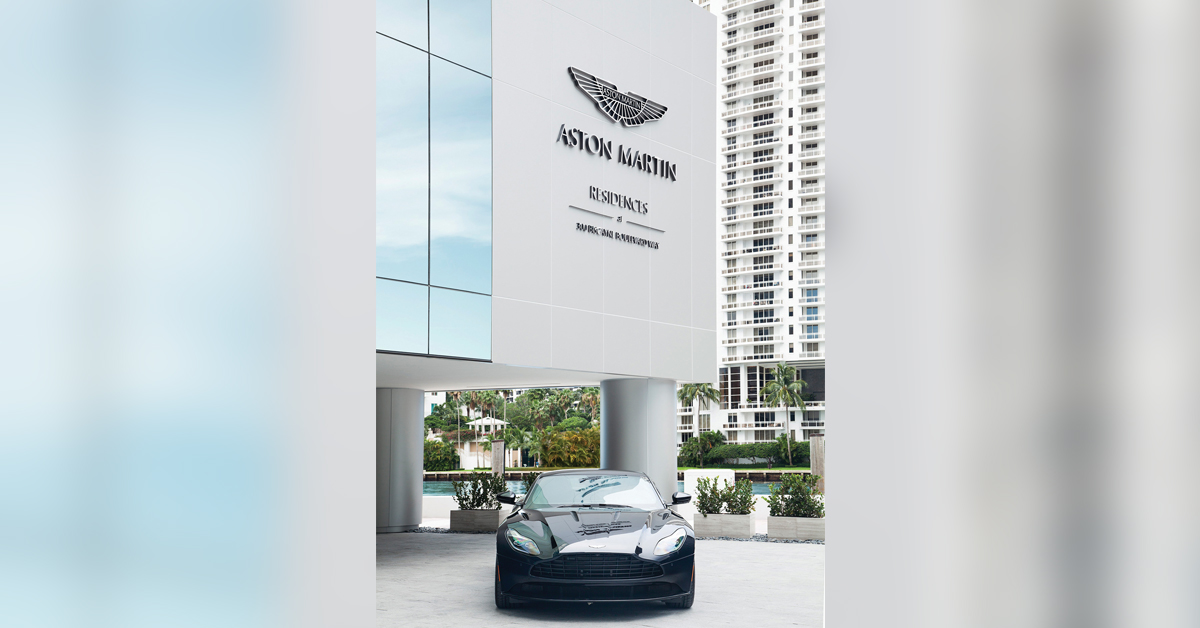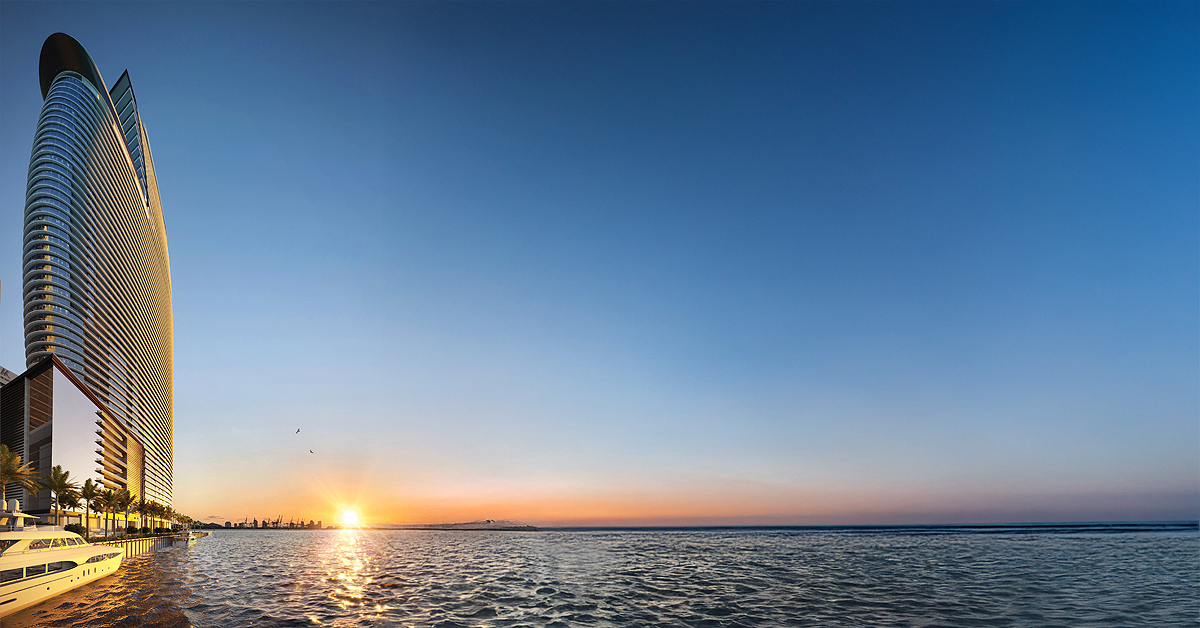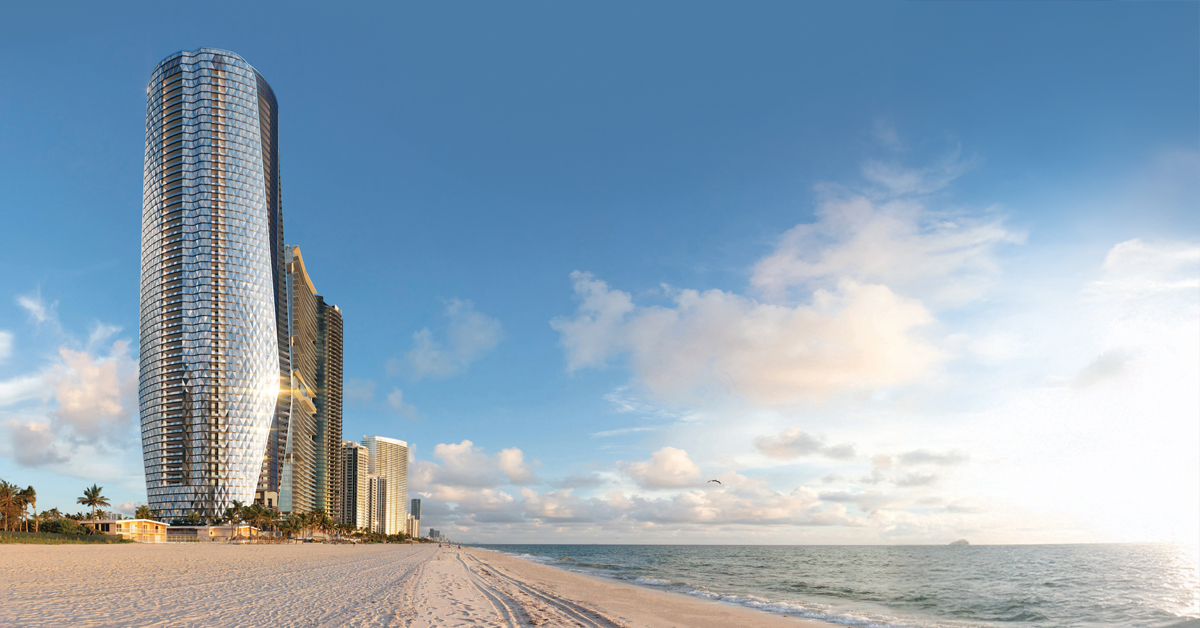
By Cynthia Corzo
Luxury names from automakers to fashion brands are increasingly showcasing their brands on skylines in popular cities around the globe, from Dubai, United Arab Emirates, to Miami.
The blending of luxury and branding in residential real estate took off in Miami 15 years ago and shows little sign of slowing.
Until recently, these buildings were sold based on location and the level of amenities they offer, Eli Beracha, director of the Hollo School of Real Estate at FIU Business, explained.
"Then marketers said, ‘How about adding a name brand to it?' and it worked," said Beracha. "It makes sense that now you're going to see more of those branded products. Developers can get more for their product because of the brand name." Miami is one of the top cities that's home to luxury condominiums with high-profile brands.
"Miami has become a world capital attracting the best of the best. Lifestyle is a key component of what makes this town shine. Brands are attracted to real estate as it is a venue to expand their base and highlight their style. It does not get any bigger than a building to express your brand," said Alexandra Goeseke Cervera (MSIRE '14), director of general real estate sales and leasing for Cervera Real Estate.
"Brands are attracted to real estate as it is a venue to expand their base and highlight their style. It does not get any bigger than a building to express your brand."
– Alexandra Goeseke Cervera
Globally, there are about 700 branded residences, with nearly the same number in development, all scheduled to launch by 2030, according to industry research. This number has increased by roughly 160% in the past decade, according to global real estate company Savills, and is expected to nearly double globally by 2030.
Latin America remains a strong force in our marketplace and along with other foreign buyers and their favorite brand is the USA and the protection it offers, Goeseke added.
One benefit for buyers of these luxury condos is that there is no need to explain the value and prestige of their residence to others.
"Living in Porsche Design Tower or Fendi Chateau Residences has immediate luxury-brand recognition," said Anthony Miyazaki, professor of marketing and logistics at FIU Business. "For people who want this type of brand signaling and conspicuous consumption, luxury-branded residences are a perfect match."
In most cases, iconic brands that partner with residential developers to enter a market – often far removed from the one they're famous for, are looking to establish a new footprint.
"When you talk of brand extension, you're trying to build upon the brand name to sell to new audiences," said Miyazaki. "The benefits to brand extension also include expanding revenues and new products."
Many luxury car brands are looking at the residential marketplace as their new strategy to extend the strength of their reputation for high quality and exceptional service into lavish homes.
 A signature feature of the Aston Martin Residences in Miami is a car elevator that allows residents to park in a "sky garage" outside their apartments.
A signature feature of the Aston Martin Residences in Miami is a car elevator that allows residents to park in a "sky garage" outside their apartments."It says something about the culture of the city," said Beracha. "We know people here love their cars; how many Lamborghini, Ferraris and Aston Martins do you see when you drive in Miami?"
The Porsche Design Tower led the car trend in South Florida, opening in Sunny Isles Beach, Florida in 2017. Prices for the 60-story tower's 132 condos ranged from $5 million to $32 million for a four-story penthouse. One of its signature features - a car elevator that allows residents to park in a "sky garage" outside their apartments.
The Aston Martin Residences Miami opened in May 2024 and is the British luxury sports carmaker's first branded residential building in the world.
 The Aston Martin Residences Miami is the British carmaker's first branded residential building.
The Aston Martin Residences Miami is the British carmaker's first branded residential building.The 66-story tower on Biscayne Bay at the mouth of the Miami River has 391 units that were sold for $1.5 million to $8.5 million, while penthouses ranged from $16 million to $59 million. Aston Martin reports indicated that 99% of the properties sold before the building was completed.
Cervera Real Estate has been leading sales and marketing of the project since sales launched in 2016, and Goeseke explained that Aston Martin has been very hands-on with the project's construction. Additionally, many of the finishes – hardware on doors, automotive-quality leather on door handles and other accents – and furniture were created at the automaker's facilities in the United Kingdom.
"It's not just licensing the brand," said Goeseke. "There has to be a right fit with the values of the developer, the quality of the construction and a salesforce to execute the dream. They have to match up with the right person; it's much like dating."
Two other car manufacturers are just getting their first Miami high-rises off the ground.
Construction began in March 2024 on the 62-story Bentley Residences in Sunny Isles Beach. The 216 units are already 40% sold, with prices starting at $5.6 million, and it's scheduled to be completed in late 2027. This property, too, will have elevators designed to take residents up to their doorstep while seated inside their cars.
In February 2024, Mercedes-Benz signed a deal to build a condominium in Miami's Brickell neighborhood, the first branded real-estate project for the automaker in the U.S. With 60 stories and 791 units, Mercedes-Benz Places is scheduled for completion in 2028. Studios are selling for $550,000 and three-bedroom apartments for $4 million. Buyers began purchasing units at the condo off the floor plans, even before the model unit was opened.
"As a consumer, when you hear Mercedes-Benz or Porsche, you think quality, even though it has nothing to do with the construction of a building," said Sebastian Garcia (MSIRE '17), real estate advisor at Compass Real Estate in Miami. "You correlate the brand with the quality of the building."
Luxury fashion brands have also entered the residential landscape.
Fendi Chateau Residences, which opened in Surfside, Florida in 2016, was the first Fendi-branded residential project in the world. Armani followed with the Residences by Armani Casa in 2020 in Sunny Isles Beach, Florida. Missoni Baia in Miami, the first-ever branded residence from Missoni, opened in 2023.
A Dolce & Gabbana supertall condo-hotel, its first real estate project and condo hotel in the U.S., is slated for completion in 2027 in downtown Miami. Even Elle magazine will make its first foray into real estate with a 25-story condominium building: the Elle Residences Miami.
"These buildings are basically selling for whatever they would otherwise sell for, plus a premium for the brands," Beracha said.
 Construction began in March 2024 on the Bentley Residences in Sunny Isles Beach, Florida, which will feature a diamond-patterned glass façade. Rendering credit: Dezer Development
Construction began in March 2024 on the Bentley Residences in Sunny Isles Beach, Florida, which will feature a diamond-patterned glass façade. Rendering credit: Dezer DevelopmentReal estate development allows luxury brands to create a physical presence that reflects their brand and values, and strengthens their image. Some have built-in customer bases among faithful fans. Another target: high-end buyers seeking exclusivity and sophistication.
"The names add new flavor to not only where you live, but how you live," said Miyazaki. "People recognize the brand and now they realize what to expect."
But there are challenges and risks, including diluting the meaning of the brand.
"The brands behind luxury residences always need to provide service that matches the elite level of their brand image – and this can be a difficult task," Miyazaki added. "Brands known for high-quality fashion and high-quality performance are not necessarily known for the type of design and functionality that is required by luxury residences."
Buying into branded properties also means fully embracing the brand's status and reputation. A reputational hit or negative publicity can impact buyers' interest in a property and market value.
"A scandal or tragedy – or in today's world, a social media mishap – could taint the status and reputation of the brand in one product or service category and likely will transfer across to how people feel about the brand in all categories," Miyazaki said. "Thus, it's critical to assess the likelihood of controllable risks prior to venturing into these areas."
The branded-residences sector has experienced sustained growth, and few in this sector doubt that luxury living will grow in popularity, with further expansion and diversification forecasted. And Miami's attractiveness is on the rise.
"In Miami, luxury real estate is going to appeal to a new demographic: people coming from New York, Los Angeles and other places," said Garcia, who described it as a mass exodus. "No state tax and great weather make Florida increasingly appealing."
Migration into Southeast Florida remains strong, with 153,347 driver's licenses exchanged for Florida licenses in 2023, an 8.3% increase from 2022. Also contributing to investors' interest in Miami are rising property values, up an estimated 10% from last year following a 12.3% increase in 2023 and 10.2% in 2022.
It's a win-win for developers who are responding to continued demand for real estate investment opportunities from both international buyers, primarily from Latin America, and U.S. residents.
"Miami will always attract more international buyers, but recently we're getting a lot of in-migration moving to Miami or purchasing a second home here," said Beracha. "Those are the ones buying these units."
As brands and developers alike explore new opportunities for growth, Miyazaki ventured that a creative possibility would be in branded communities, where the luxury component would be in how these are planned. Their location would be away from the "noise, congestion, traffic and communities" where luxury branded residences stand today.
"This level of luxury design and service provision likely would appeal to those who desire more than just a mere gated community," he said. "It would be a lifestyle that is rich with the prestige and quality that these brands represent to their audiences."